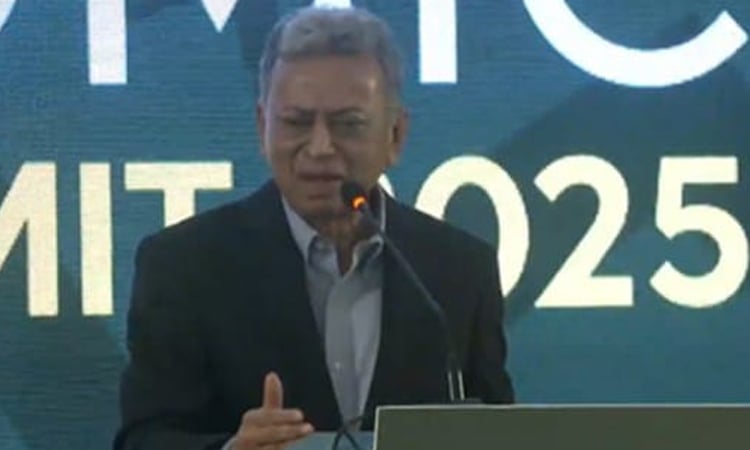News Flash
News Flash

DHAKA, Oct 27, 2025 (BSS) – BNP Standing Committee Member Amir Khasru Mahmud Chowdhury today laid emphasis on the necessity of democratization of economy to ensure equal opportunities for every citizen.
“The existing economic model is fundamentally flawed because it has only worked for a section of the populace, failing to benefit the general public,” he made the remarks while speaking as the guest of honour at the ‘Economic Reform Summit 2025’ at a hotel in the city.
Voice for Reform, BRAIN, Fintech Society, INNOVISION and Nagorik Coalition organised the two-day summit.
In his speech, Amir Khasru Mahmud insisted that the economy must work for everyone, ensuring universal participation.
“If national development occurs without the common people sharing in the benefits, the economic model is defective,” he opined.
To achieve this democratization, he outlined plans for shifting investment focus away from mere social safety net handouts to enabling economic participation.
He cited the ‘One Product, One Village’ model seen in countries like Thailand, where villagers produce high-quality goods at home and sell them internationally online, generating vast economic activity.
The goal is to make the products of marginalized groups tradable both locally and internationally, he added.
To combat corruption, harassment, and bureaucratic hurdles, Amir Khasru Mahmud strongly advocated for reducing, or where possible, eliminating physical contact between citizens and government offices.
He highlighted that in developed nations worldwide, citizens should not be required to visit or constantly pursue government offices.
Instead, he added, services such as electricity bills, telephone bills, and passport renewal are handled entirely online.
He opined that "This push for e-governance in Bangladesh should extend to every service provided to citizens, not just investment processes"
Executive Editor of the Counterpoint Jyoti Rahman and President of the CFA Society Bangladesh Asif Khan delivered keynote presentations.
Business Initiatives Leading Development (BUILD) Chairperson Abul Kasem Khan, Chairman and CEO of Policy Exchange Dr. Masrur Reaz, Adviser to BNP Acting Chairperson Mahadi Amin, Spokesperson of the Bangladesh Jamaat-e-Islami in the United States Dr. A.S. Nakibur Rahman, Joint Convenor of NCP Khaled Saifullah, Member of the General Economics Division of the Ministry of Planning Dr. Monzur Hossain, Vice Chancellor of the Independent University of Bangladesh Prof. M. Tamim, BNP Chairperson's Special Advisory Committee on Foreign Affairs Israfil Khosru, Partner of the Snehasish Mahmud & Co Snehasish Barua and CEO Chaldal Waseem Alim joined the first session on ‘Essential Reform for Removing Investment Barriers' as panelists.
Jyoti Rahman delivered the presentation focusing on macroeconomic stability and economic recovery, highlighting that achieving these goals is the essential prerequisite for all future policy discussions.
He said Bangladesh has untapped labour resources, particularly concerning the female workforce.
Only about one-third of the labour force is female, compared to nearly half in many other Asian countries, he added.
He also mentioned that improvement is needed in the country's connectivity index (a measure of how connected ports are to the world), which presents room for significant development.
Rahman concluded that the newly elected government will inevitably face difficult trade-offs in stabilizing the economy.
To manage these issues and pursue higher aspirations, he said that the new government will have to focus on the establishment of credible institutions and ensuring meritocratic appointments in key economic positions.
Ultimately, the focus must shift beyond stabilization toward implementing a new growth model to democratize the economy and achieve the nation’s expressed aspirations, he added.
In his presentation, Asif Khan suggested that Bangladesh should consider emulating Vietnam’s recent initiative, which established the private sector as the key driver of the economy.
This model requires setting specific Key Performance Indicators (KPIs) and timelines, he added.
He said the government should move away from numerous mega projects (which could utilize Private Public Partnerships) and focus instead on soft infrastructure which are required to maintain the economic, health, cultural and social standards of a population .
Government investment should target high-impact, high-ROI spaces where the private sector is not engaging, such as increasing cold storage capacity in agriculture, he added.
He concluded by reiterating that capital misallocation must be carefully addressed and emphasized that structural reforms are multifaceted, requiring action across all areas simultaneously to restore investment growth.